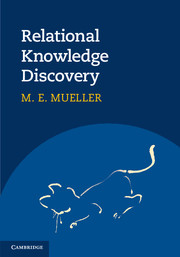About this book
Published online by Cambridge University Press: 05 July 2012
Summary
If you want to make it right,
make it wrong first.
What it is about
This book is about knowledge discovery. There are many excellent books on machine learning and data mining. And there are many excellent books covering many particular aspects of these areas. Even though all the knowledge we are concerned with in computer science is relational, relational or logic machine learning or knowledge discovery is not that common. Accordingly, there are fewer textbooks on this issue.
This book strongly emphasises knowledge: what it is, how it can be represented, and, finally, how new knowledge can be discovered from what is already known plus a few new observations. Our interpretation of knowledge is based on the notion of “discernability”; all the methods discussed in this book are presented within the same paradigm: we take “learning” to mean acquiring the ability to discriminate between different things. Because things are different if they are not equal, we use a “natural” equivalence to group similar things together and distinguish them from differing things. Equivalence means to have something in common. According to the portion of commonness between things there are certain degrees of equality: things can be exactly the same, they can be the same in most cases or aspects, they can be roughly the same, not really the same, and they can be entirely different. Sometimes, they are even incomparable.
- Type
- Chapter
- Information
- Relational Knowledge Discovery , pp. 1 - 3Publisher: Cambridge University PressPrint publication year: 2012



